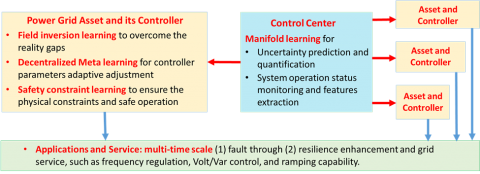Technical Approach
The objective of the proposal is to develop a robust AOCPO framework, enabling multi-time-scale decentralized control for different power grid assets and controllers to enhance the resilience of power systems with increasing uncertainties and dynamics. Fig. 1 gives a conceptual illustration of the AOCPO framework. It consists of an uncertainty quantification and operation status feature extraction module running at the control center level as well as decentralized controller parameter optimization and adaption module for different assets and controllers in the power grid. Based on the predicted uncertainty and extracted real-time grid operation features from the novel manifold learning method, the controller parameters of different power grid assets could be adjusted online to adapt different power grid operation conditions and contingencies by incorporating three innovative AI technologies: (1) field inversion learning, (2) decentralized meta reinforcement learning, and (3) safety constraint learning. The adaptive and robust multi-time scale control and service enabled by the proposed AOCPO framework could significantly increase the reliability and stability of modern power grid.
